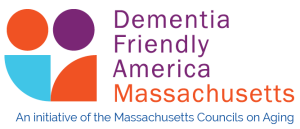DF Training Resources by Sector
The Dementia Friendly initiative recognizes a total of 11 core sectors within a community. In the process of becoming dementia-friendly, a community must have at least three sectors represented in their action team. To understand how these sectors can collaborate toward the shared goal of supporting adults living with dementia, read about Dementia Friendly Essentials.
Consider integrating age-friendly actions into your dementia-friendly initiative.
Advance financial planning is critical after receiving a dementia diagnosis. In addition to navigating difficult fiscal decisions, professionals can help identify security fraud and exploitation of an older adult.
Dementia Friendly America reports, “With 70% of people with dementia living at home, they and their family care partners will choose businesses that are easy to navigate and that have helpful, aware staff,” demonstrating that companies benefit from undergoing minor environmental changes and providing staff training. Businesses must also consider how employees that are care partners to a person with memory loss are supported in the workplace.
Faith communities can be integral in supporting the spiritual, emotional, and social health of an individual with dementia. Faith communities can become inclusive by hosting dementia-friendly events and promoting dementia awareness through education. Faith leaders can offer special accommodations to families struggling with dementia care to continue to practice their religion.
First Responders work every day with older adults and can clearly benefit from understanding how to work with people living with dementia. It is especially important that First Responders can quickly identify people living with the condition so that they can modify the way the patient is treated.
Healthcare Throughout the Continuum
Because of the ongoing cognitive and sometimes physical changes, living with dementia requires regular evaluation of the effectiveness of healthcare on the wellbeing of the individual. Adults and their families should consider healthcare decisions such as determining a healthcare proxy, residential versus at-home care, and future end-of-life services.
Hospital visits can be jarring for any person but can be especially confusing and alarming for someone with dementia. Hospitals can introduce employee training programs and implement environmental changes to make the experience more tolerable.
Legal & Advance Planning Services
Legal professionals prepare adults with dementia for long-term care. Family members, friends, or care partners may be involved in this process. Guardianship, healthcare, and financial decisions are all considered when planning for the future.
As a welcoming, nonjudgmental, public space, libraries can provide services and offer resources for people with dementia. Libraries can offer suggested reading lists about dementia or caregiving, or go so far as to host events such as memory cafes or support groups. Employees and volunteers at libraries may observe early warning signs of dementia and can be vital in promoting continued socialization and normalcy for a person experiencing cognitive changes.
Commitment from local government ensures that your municipal agencies are aware of the dementia-friendly initiative and are accountable for continuing actions well beyond the recognition phase. First Responders & Law Enforcement play a key role in overseeing the safety of residents with dementia as they are responsible for notification systems like the Silver Alert and responding to unsafe behaviors that may occur with a dementia diagnosis. Systems & Community Programs can introduce services and changes to public spaces to provide a more welcoming and inclusive environment.
An educated public aware of the needs and challenges of a neighbor with dementia can recognize when an older adult might benefit from extra help. The more substantial the collective effort by all people to understand and improve the lives of their neighbors with cognitive or physical hardships, the more inclusive a community becomes.
Young people are becoming more involved in dementia awareness. Schools around the country are introducing age-appropriate lessons to teach students about dementia ranging from empathy toward forgetful adults to the neurological changes that occur in a brain affected by Alzheimer’s Disease. Youth lead movements, after-school clubs, and scouting projects are just a few ways in which children and teenagers can become involved in the dementia-friendly initiative.
Offering accessible transportation in a community provides residents the opportunity to live independently. Feelings of confusion or disorientation are common for people with cognitive changes, particularly while traveling. Public or private dementia-friendly transit options can allow an individual to leave home and reach their desired destination safely.
